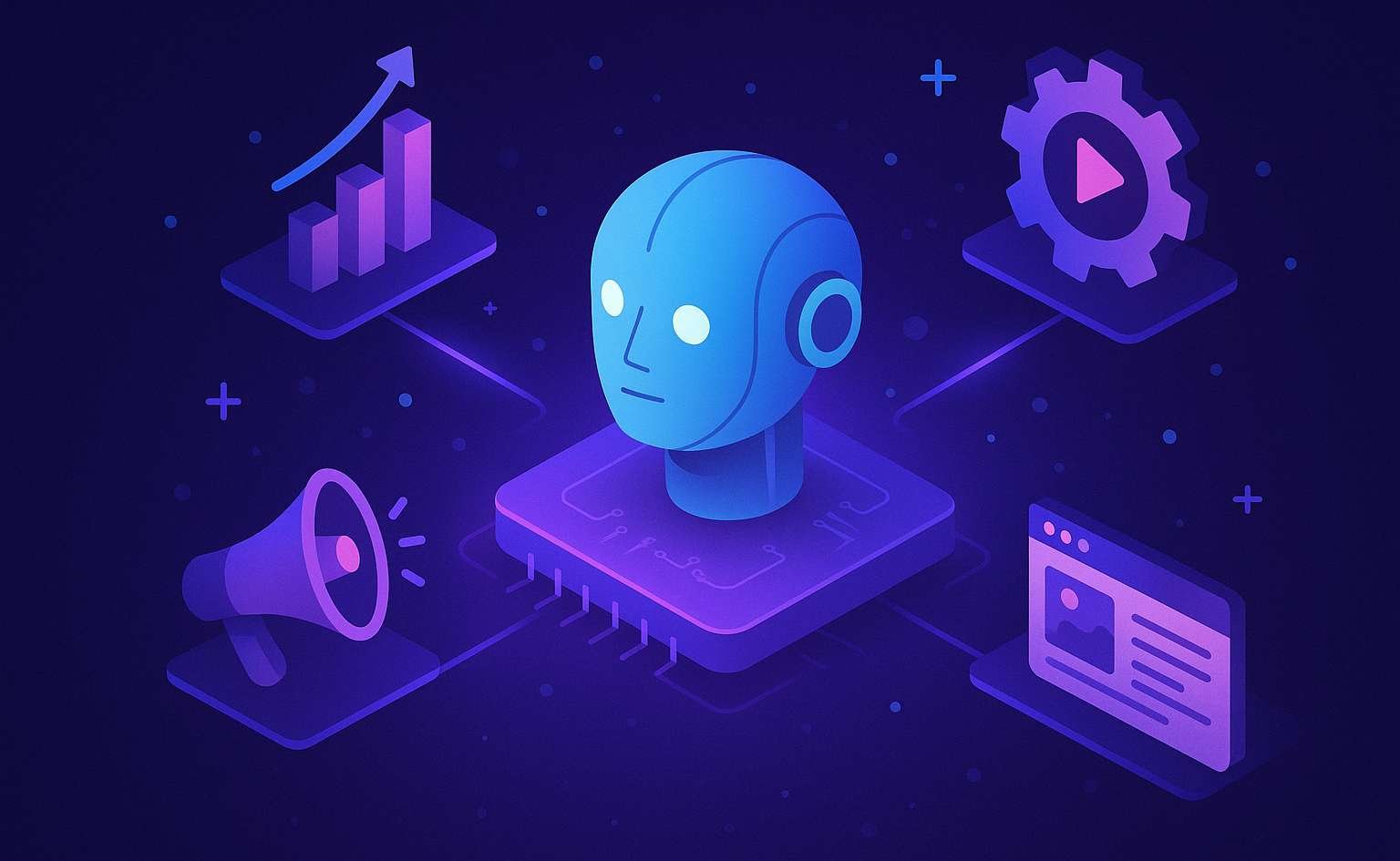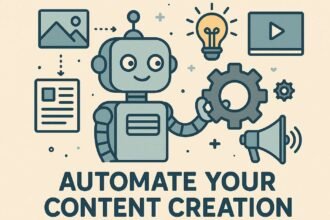Introduction to Artificial Intelligence in Marketing
Artificial intelligence (AI) is a game-changing technology that is transforming a variety of industries and business processes—including marketing. These transformation possibilities have led to a diverse array of AI frameworks designed to help organizations implement AI tools in a way that is consistent, efficient, and effective.
The Microsoft Azure Machine Learning Framework, for example, is a five-stage process that guides companies in applying AI models to specific business scenarios. The purpose of the framework is to help companies perform AI-driven personalization, enhance the customer experience, and improve decision making with data.
Understanding AI Frameworks
The power and prominence of artificial intelligence (AI) continues to develop at an impressive rate. With major tech companies like Microsoft, Google, and Open AI investing significant resources and infrastructure, the horizon of AI capabilities is expanding rapidly. These encouraging results have led many companies and organizations across virtually every sector to consider how they can apply AI in their own workflows and products.
Particular attention has been paid to marketing services and initiatives, where AI has the potential to dramatically transform customer experiences and connections. The main challenge lies in identifying the specific marketing needs, evaluating the potential of the available AI tools, and formulating a framework to integrate these tools. In essence, an AI framework serves as a comprehensive set of guidelines that describes how artificial intelligence can support an organization in achieving particular marketing objectives.
Definition of AI Frameworks
The relevance of artificial intelligence in marketing is increasing. An artificial intelligence framework provides a skeleton for the proper use of artificial intelligence to transform a marketing approach.
The increasing availability of connected smart devices that produce a lot of data is creating a lot of business opportunities. Processing this enormous amount of complex data requires intelligent systems. As bots also become more intelligent, their use in marketing is increasing. Different frameworks make artificial intelligence useful. Chatbots can coordinate with marketing managers to collect feedback in a structured format and analyze sentiment, which builds the store brand and promotes sales. Similarly, these bots can also gather data about the customer’s needs and preferences and report it to the management. A customer support bot used in the service industry can use geotagging to identify the location of the customer and the possible reason for the complaint and accordingly assign the call. Such technologies not only can decrease the average handling time but also increase customer satisfaction. Several technology developers are developing such artificial intelligence modules to help marketers improve customer experience, which helps organizations transform their marketing approach.
Types of AI Frameworks
Artificial intelligence frameworks play a significant role in the development of effective business and marketing strategies. When organizations are aware of various types of AI frameworks, marketing decisions become timely and more efficient. Frameworks serve as building blocks in the overall AI landscape, encompassing tools, libraries, interfaces, and methodologies that guide the development and tuning of AI models. Indeed, the right framework ranks among the highest priorities when selecting an AI platform.
Under the theme “Transform Your Marketing Approach with an Artificial Intelligence Framework,” several tools are available to help identify appropriate models for data analysis and marketing needs. Defining the marketing requirement is the initial step. Subsequent consideration of data model types facilitates the selection of a suitable tool tailored to promote the selling of desired products and services. By adapting an AI framework accordingly, marketing approaches can be effectively redefined.
The Role of AI in Modern Marketing
Transform Your Marketing Approach with an Artificial Intelligence Framework Artificial Intelligence (AI) offers important new capabilities for organizations striving to improve marketing performance. From improved predictive analytics to automated product recommendations, AI tools can transform approaches to delivering personalized experiences for customers. They allow marketers to address a variety of different needs, including improving customer retention, shortening the sales cycle, optimizing digital advertising campaigns, and enhancing the overall customer experience.
Implementing an AI framework enables marketing leaders to realize these benefits and prepare their organizations for success. Fundamentally, it provides structure by identifying specific marketing challenges that AI can help address. It helps with evaluating different AI tools and selecting those best suited to meet targeted needs. And it establishes best practices for managing in-house AI-driven marketing initiatives.
Personalization and Customer Experience
Customer-centric marketing is key to building long-term relationships with consumers and creating repeat business. Artificial intelligence now makes it possible to maintain a one-to-one communication with customers rather than the traditional one-to-many approach. This technology enables companies to personalize every communication and offer in a timely and relevant way.
Thanks to artificial intelligence and machine learning, companies can organize datasets, understand how people communicate, and replicate tactics from the past that generated interest and positive responses. As a result, companies can rapidly increase leads, prospects, sales, and engagement. This approach not only captures the attention and interest of potential and existing customers but also spotlights signals, trends, and widespread consumer reactions to marketing campaigns.
Data-Driven Decision Making
As AI continues to revolutionize the way businesses communicate with their clients, it is shifting from merely offering personalized content to delivering a more tailored customer experience. This transformation enables companies to foster more meaningful connections that resonate on a deeper level. Yet, merely possessing an AI framework is not sufficient. Just as possessing a map does not guarantee travel to any chosen destination, AI tools themselves do not ensure successful marketing outcomes. Marketers must first identify their specific needs and then implement relevant AI tools to address them.
One crucial capability of AI is its data-driven approach to decision making. Thanks to digital ecosystems, AI can collect comprehensive datasets about consumers throughout the entire customer journey. By processing these vast repositories of information with advanced analytical methods, companies can uncover in-depth insights and understand real-time customer sentiments. Such analytical power allows marketers to pinpoint the most promising segments or leads, make informed resource-allocation choices, and select messaging strategies that optimize conversions and enhance lead quality.
Implementing AI in Marketing Strategies
Marketing strategies have always been challenged by customer personalization, with businesses seeking new ways to provide unique experiences and improve customer satisfaction. Artificial intelligence (AI) offers a solution by handling these tasks automatically, presenting a new horizon for the business and increasing its market value. Implementing AI effectively requires a marketing team capable of deploying these technologies within their activities, asking the right questions to discover suitable tools, recognizing the data and customer representation from which these operations can be executed, and identifying the environmental factors influencing tool selection in the initial phase.
The analysis begins by specifically defining the organization and department, followed by a critical evaluation of the marketing element that can be optimized through AI—such as positioning, targeting, marketing mix (4P), forecasting, or automated advertising management. Next, the available AI offers and the needs they address for the defined marketing element are examined. Currently outstanding are AI-powered forecasting algorithms and automated advertising systems. Special attention is also given to AI systems oriented toward the marketing mix, customer classification, and combinations thereof, which have the potential to alter the approach to customer and product management. Finally, the environment, organizational aspects, and external influences on the adoption of AI in marketing are assessed. These considerations culminate in a roadmap guiding the marketing transformation inspired by an AI framework.
Identifying Marketing Needs
The growing significance of artificial intelligence in marketing prompts executives to explore ways of transforming their organizations into AI-driven enterprises. They seek to understand the role of AI frameworks in marketing, recognize factors that lead companies to transform their marketing approach by using an AI framework and the benefits that they derive, review the key challenges involved when creating an AI-driven marketing approach, and examine how companies can implement an AI-driven marketing strategy.
Although the term ‘artificial intelligence’ inspires visions of human-like thinking and reasoning by machines, it is important to develop a clear working definition before considering how AI can be used in marketing. Several related support definitions and examples set the stage. An AI framework is a software framework of predefined code that can be used by developers to build artificial intelligence applications in a systematic, structured fashion. Different types of AI frameworks are available for different AI requirements in machine learning, deep learning, or natural language processing.
Choosing the Right AI Tools
Artificial intelligence can transform your marketing approach by allowing you to more effectively reach target customer groups, enhance customer experience, and analyze market data. To realize these benefits, however, businesses must carefully identify specific marketing needs before proceeding with AI implementation. During this phase, determining the appropriate AI tools is of particular importance.
Choosing the right AI tools entails researching options in detail and matching them to identified needs. For instance, social media management is an essential marketing aspect for many companies. Various platforms offer AI-powered social media management features, and selecting an appropriate platform requires thorough examination of features and targeted customer segments. Likewise, customer relationship management tools, which often incorporate AI capabilities, can enhance customer experience but differ considerably. Assessing these tools against organizational needs helps ensure that selected solutions will deliver practical, positive outcomes.
Case Studies of Successful AI Integration
A prominent example of AI integration in retail is Amazon’s Use of Artificial Intelligence for Enhanced Customer Experience. Amazon employs various AI technologies, including machine learning algorithms for personalized recommendations, computer vision for image search, and natural language processing for customer service chatbots. The delivery company leverages AI for efficient logistics through warehouse automation and delivery route optimization. Amazon’s investment in AI has not only improved customer satisfaction but also increased operational efficiency and boosted sales.
Another significant case is Starbucks’ DeepBrew AI Platform, which personalizes customer experiences by facilitating one-to-one marketing and customized recommendations through its mobile app. Starbucks has established a long-term partnership with Microsoft to advance its digital initiatives and streamline operations using Azure and AI-driven machine learning models. The adoption of DeepBrew has enhanced customer engagement, optimized marketing strategies, and increased revenue. These case studies exemplify how integrating appropriate AI frameworks, tailored to specific marketing requirements and organizational goals, can transform marketing strategies and drive measurable business benefits.
Retail Sector Examples
Retail sector examples illustrate how two business operations successfully implemented AI frameworks, thereby transforming their marketing approaches. In one instance, a shop owner launched a customized coupon system using AI to deepen engagement and enhance the customer experience. The objective was to maintain competitive advantage through increased connections with customers and secure higher market shares. In a comparable project, a café owner sought AI solutions that would attract a steeper influx of visitors compared to competitors, given the outlet’s location and service offerings. Both cases addressed the same objectives—strengthening relationships with customers and sustainability—by responding to market penetration, creativity, and customer interaction issues. The empirical results confirmed that firms that adopt AI framework technology are better positioned to manage customer relationships and promote their products and services more effectively.
The first case exemplifies the rise of the ‘electronic generation’ and the associated marketing challenges, especially concerning customer relationships and loyalty programs. The second case highlights the transition from traditional communication channels such as brochures, newspaper advertisements, and billboards to advanced marketing applications that support marketing sales beyond geographic constraints. With the advent of the Industry 4.0 era, contemporary businesses are compelled to adapt to digital transformation technologies, including the Internet of Things, Artificial Intelligence, Big Data, Machine Learning, and Cloud Computing, to sustain growth in the long run. Transform Your Marketing Approach with an Artificial Intelligence Framework can be applied within these operations to nurture and streamline the business process.
Service Industry Applications
Artificial Intelligence (AI) promises transformative change across numerous sectors. Just as digital technology shifted computing—it opened a new era of transformative AI. Transformed computing enabled the highly interactive digital world of the 1990s; transformed AI will define the next 30 years. In particular, AI applied to marketing delivers a more personalized customer experience through an AI framework. As the marketing process evolves accordingly, organizations must consider the benefits and challenges of AI for marketing. Thus, exploring successful organizations that implemented AI in their marketing strategies, and analyzing the impact of AI in marketing, is worthy of study.
AI has become a focus of business in many organizations over the past decade, when connected intelligence began to emerge and vast amounts of data were produced at a pattern never before experienced. The scope of AI ranges from automating routine tasks to modeling complex phenomena. It is affecting all phases of marketing, from strategic analysis (such as marketing research, market-response modeling, and forecasting) to transforming marketing’s relationship with its customer-facing systems. The introduction of AI, particularly the AI marketing platform, offers exciting new possibilities for firms to anticipate and satisfy their customers’ needs.
Challenges in Adopting AI Frameworks
An Artificial Intelligence Framework can transform Your Marketing Approach by exposing and describing the inherent challenges with adopting AI in marketing. These include the rising requirement for customer personalization, the need to improve customer experience, the need for faster marketing decision making, and the need for alternate sources of revenue generation. Customer personalization improves marketing effectiveness and enhances customer experience. Improving customer experience decreases customer churn, improves customer retention, increases customer acquisition, and hence increases sales and revenue. Faster marketing decision making ensures the sustained relevance of marketing actions and improvised customer segmentation for centric marketing approach. Alternate sources of revenue generation enable businesses to capitalize on the company’s existing products and services and create additional revenue streams.
An Artificial Intelligence Framework can assist in identifying marketing needs and choosing the right AI tools for any marketing requirement. Most of the challenges addressed by the framework are common to all sectors. For example, the retail and service sectors are significantly affected by customer personalisation, customer experience, and revenue generation. In the retail sector, the fast-fashion apparel segment requires faster marketing decisions to keep up with the seasonal trends of customer preferences. Unfortunately, the existence of these challenges cannot be ignored; nevertheless, many organizations remain unprepared in terms of time, knowledge, and investment for adopting AI-driven technologies. Other challenges remain connected to the lack of relevant and employing data for marketing campaigns. More often, data is not shared within organizations or remains private to certain departments.
Data Privacy Concerns
Data privacy concerns encompass the safeguarding of personal information collected, stored, and processed by artificial intelligence frameworks in the course of marketing activities. Marketing frequently relies on consumer behavior data, thereby mandating strict privacy measures. The specific data privacy responsibilities attributed to AI are largely determined by the methods employed for data handling. In order to alleviate privacy risks, approaches advising caution in data utilization should be implemented. Confidentiality is maintained by utilizing data solely for its intended purposes. The direct handling of data is streamlined within an automated business environment to reduce risk. Nevertheless, it remains essential to maintain transparent disclosure concerning data management. Only pertinent data should be retained for the period essential to the organization’s legitimate interests.
To successfully transform a marketing strategy with an artificial intelligence framework, it must be driven by a thorough appreciation of the conceivable dangers related to data management. Despite the valuable business insights AI can generate from existing data, organizations should be aware that the depth of detail involved may threaten privacy and create misinformation. Ultimately, customers might reject the use of AI marketing, making it imperative to conduct such analyses with care. Therefore, the organization’s AI capabilities must be integrated cohesively with its overall business architecture and organizational culture rather than focusing on specific AI function development.
Integration with Existing Systems
Transform Your Marketing Approach with an Artificial Intelligence Framework. While some AI frameworks operate independently, many can be incorporated into pre-existing systems to optimize performance. An example is TensorFlow Model Optimization, which enables the compression of models already trained and deployed elsewhere—such as tweak slim models, prune, or quantize models. When selecting an AI framework, it is important to consider the availability of compatible modules that deliver the desired functionality, the ability to integrate with existing tools, and the proficiency of team members in specific programming languages. For those beginning their AI journey, tools like Google’s Cloud AutoML provide an accessible starting point.
Growing business needs and increasing consumer demands have necessitated the integration of various new-age technologies, including artificial intelligence (AI), to ensure a sustainable future. AI deployment has been realized across different industry verticals, with marketing playing an indispensable role. Marketing focuses on how customers perceive a product or service and enhances customer experience—a key differentiator among rivals. Customer experience is increasingly becoming the unique selling proposition in many industries. The rapid increase in data volume has rendered traditional marketing methods inadequate. As a result, marketing activities have become more data-driven, making AI indispensable for various marketing initiatives. Moving forward, it is essential to outline a roadmap for implementing an AI-based marketing framework that can guide organizations in transforming their marketing approach with an artificial intelligence framework.
Future Trends in AI and Marketing
Artificial intelligence (AI) is a pillar of transforming marketing by means of an AI framework that is changing the landscape of how marketers interact with their customers and prospects. Marketing and personalization are increasing in importance, and consumer expectations are raising the stakes for customer experience. To keep up, businesses must rely on an AI framework of solutions and capabilities that can enable marketers to offer the ever-more-personalized experiences that customers demand. An AI framework can transform marketing by delivering the insight to make better decisions.
Today, companies use an AI framework to operationalize marketing creation, define marketing’s voice, and actively orchestrate execution. New AI capabilities will continue to transform how brands compete at every stage of a campaign. Marketers in every vertical are focused on transformations that improve their ability to offer the kinds of customer experiences that help boost recognition, revenue, and long-term relationships. To unleash the power of AI, businesses apply an AI framework to simultaneously develop AI-driven marketing strategies, ensure the responsible use of AI to safeguard customer experiences and brand reputation, and build an AI-driven marketing team capable of delivering the inner genius of AI tools.
Emerging Technologies
The increasing awareness of the strategic impact of artificial intelligence has made AI the hottest topic protein not only in the MarTech field but also in other areas. An AI framework is a prebuilt pack of code and libraries for the rapid implementation of AI-related applications. It is an environment where programmers utilize machine-learning algorithms to assist them with the development of AI-based applications. An AI framework is essential for building a successful AI strategy. It allows marketers, designers, and machine-learning experts to collaborate effectively and enables the implementation of ideas at the highest level of creativity, providing guidance to the team while also offering the freedom to be creative.
Marketing initiatives are becoming more ardent in their quest to enhance customer experiences. They understand the power of sophisticated segmentation and automation built into customer-centric marketing strategies, which consistently outperform standard marketing tactics. Marketers are actively seeking data to support customer satisfaction, better targeting, and increased sales. Techniques such as behavioral marketing—timing messages based on an audience’s interest in a product, detected through profile data or analysis of prior behavior—result in higher click-through and conversion rates. To summarize, the artificial intelligence framework helps transform the marketing approach by leveraging these advanced capabilities.
Predicted Market Changes
The continued advancement of AI technologies such as machine learning, natural language processing, and computer vision is expected to make AI systems even more capable of understanding and predicting human behavior. This will enable even greater levels of personalization and targeting within marketing campaigns. For example, AI-powered systems will be able to analyze not just individual consumer data, but also data from social networks to predict how trends may spread and influence consumer behavior. As these changes unfold, organizations that have already implemented AI technologies within their marketing functions will be well-positioned to capitalize on the benefits. They will have access to greater volumes of high-quality data, more powerful prediction and analysis tools, and more efficient allocation models. This will translate into improved marketing performance and a stronger competitive position in the marketplace. Yet many organizations are lagging behind in their adoption of AI technologies, particularly when it comes to implementing AI frameworks that enable them to fully realize the potential of AI. Creating such a framework involves identifying the key opportunities within marketing where AI can play a useful role, selecting appropriate AI tools and technologies, and deploying them in a manner that leverages their strengths and mitigates their limitations.
Ethical Considerations in AI Marketing
Ethical Issues of Using Artificial Intelligence in Marketing. Technological breakthroughs such as artificial intelligence (AI) have dramatically increased the world’s ability to collect, utilize, and share business and consumer information. The ability to extract deep insights from data and implement those insights to create highly targeted and personalized ad campaigns can be tremendously valuable. Consumer protection concerns arise, however, when the use of such advances can lead to discrimination and other questionable marketing practices.
Although many marketing and AI frameworks both aid in understanding the role of artificial intelligence in marketing, they tend to concentrate on the positive aspects of AI in marketing. The real problems of data privacy and AI algorithm transparency are often overlooked. An AI framework enables marketing professionals to assess their needs and select appropriate AI tools or technologies to address those needs effectively. It also provides guidelines for deploying AI in order to avoid potential negative consequences.
Transparency and Accountability
Transparency of operations and decision-making processes strongly emerges as a key principle that anyAI Framework for Marketing should provide. Robust policies on evaluating and sharing information on the ethical use of artificial intelligence must be incorporated. AI solutions that discriminate against particular races or ethnic groups for a company’s hiring practices or that go against other diversity and inclusion programs must be avoided or modified. An outcome-based approach examines the performance of AI systems across different populations and evaluates whether the quality of results meets organizational standards. Examination of the framework focuses on outcome differences, rather than on the nature of the algorithm or data set.
In the case of algorithm transparency, the required level of disclosure depends on the associated risks of a particular AI-driven activity. For example, it is imperative to identify a company’s main decision-makers when using artificial-intelligence-generated content intended to be factual and based on a given level of research and investigation. Yet an algorithmic level of transparency—information about design or data inputs—is not necessarily expected for every kind of use case. Less risky situations, such as prompt engineering that generates artistic images or music, might require only high-level transparency. Accountability and process transparency demand that processes and individuals responsible for decisions can be identified and contacted, as well as that clear protocols for audit and redress are defined. Algorithmic bias should be tested both at the technical level and with regard to the impact of biases detected in a product’s wider use case.
Bias and Fairness in AI Algorithms
Despite its immense potential to transform marketing, artificial intelligence presents new challenges and concerns, including issues of bias and fairness that require attention by consumers, organizations and government alike. AI models draw on existing and historical data in order to learn and make decisions, but such data may replicate societal inequalities, causing the model to perpetuate those imbalances in a process known as “algorithmic bias.” Individuals working without sufficient sensitivity during model design can either introduce or amplify biases, therefore careful regard for fairness and accountability is critical in execution.
A common recourse to these risks is simply to use as much data as possible, but that approach is neither feasible in all situations nor guaranteed to produce the desired results. Therefore, reliance on good privacy practices, robust security procedures and comprehensive access controls is prudent. These mechanisms further support mitigation of bias and protection from other vulnerabilities.
Measuring the Impact of AI on Marketing Performance
Accurately tracking the progress of marketing campaigns is central to understanding their effectiveness. Besides outlining appropriate qualitative characteristics, such as market share or brand awareness, marketing managers must also set quantifiable objectives. A marketing information system assists in collecting, processing, and analyzing the relevant metrics for these objectives and presents the data concisely for decision-making purposes. Once an Artificial Intelligence Framework has been implemented within the marketing strategy, the marketing information system becomes essential in evaluating marketing performance and quantifying the actual contribution of AI tools.
Marketing activities that aid in the feedback process—directing the marketer when planning future strategies—help in measuring results. Appraising a marketing plan’s success and return on investment is necessary to rectify its implementation. Another objective of marketing information is to provide managers with the insight and rationale behind success or failure. Concerning AI-specific marketing objectives, pertinent questions include asking real-time databases if average customer spending on certain products has increased, inquiring with a KPI information base which data mining technique yields the highest success rate, or consulting a shopping mall information base regarding rental prices compared to surrounding commercial districts.
Key Performance Indicators (KPIs)
An artificial intelligence framework serves as a collection of neural networks trained in various AI tasks. By applying transfer learning, organizations can substantially reduce the training time and datasets typically required to develop successful AI capabilities. These frameworks enable firms across diverse industries to implement artificial intelligence technologies, unlocking new potentials.
Transform Your Marketing Approach with an Artificial Intelligence Framework. Marketing is entering a new era. Every aspect of the discipline—from targeting and personalization to experiences and attribution—is driven by data. We are living in a moment when marketing performance measurement is undergoing the most fundamental change since the advent of digital. Although marketers now have access to more information about performance than ever before, that information is seldom presented in a form that is useful, or used to ensure that marketing is as effective as it could be. The way forward is to measure the impact of marketing on outcomes that matter for business performance—both for the brand and for the business. Once marketers have a measure of impact, they can make this measurement available for ongoing business decisions and use it to allocate spending more effectively.
ROI Analysis
In the white paper “Transform Your Marketing Approach with an Artificial Intelligence Framework,” careful guidance shows how businesses can identify needs and opportunity areas in marketing and select appropriate artificial intelligence tools to tap those areas. The potential benefits of AI in marketing — including motivated employees and the ability to offer a better customer experience — are often touted, but other considerations must also be addressed to make the best use of AI tools.
Finally, an AI marketing framework that guides an organization in identifying key areas where artificial intelligence can be leveraged can have a powerful impact. If key performance indicators are identified up front and the organization builds a dashboard to track effectiveness and provide early warning signs, the return on investment can be quite dramatic.
Building an AI-Driven Marketing Team
The rise of artificial intelligence in marketing has led to the creation of specialized roles such as developers, data scientists, and engineers. New roles and skill sets are necessary for the effective development and maintenance of AI-driven marketing tools. While marketers may not engage in coding or training AI models, possessing foundational knowledge of AI can facilitate more efficient collaboration with data science teams.
Given the substantial business transformation that AI adoption entails, it is crucial to identify the appropriate use cases and marketing activities within an organization. Practical experience gained by testing and integrating AI solutions, supported by the proper leadership and culture, contributes to a positive AI transformation. Organizations should select AI tools that align with their core marketing requirements. Distributors handle end-to-end process automation, including campaign management, performance reporting, data generation, and communication scheduling. In contrast, generators focus on content creation and generally require manual activation within campaigns.
Skill Sets Required
The implementation of artificial intelligence in marketing requires the identification of organizational functions and the setup of a team to drive AI advancement. A vital step involves the assembly of a set of AI skills, which may either reside within the organization or be sourced externally. Since artificial intelligence demands significant organizational support and business acumen, teams advancing AI initiatives must possess a nuanced understanding of the organization’s marketing goals, a comprehensive grasp of domain knowledge, and the analytical and interpretive skills necessary to explain AI-generated insights.
Furthermore, a single individual or a few people are generally incapable of handling the complexities of the project and the organization’s objectives comprehensively. It is, therefore, advisable to establish an interdisciplinary team. Individuals within this team need to encompass knowledge and skills in diverse areas including marketing, consumer psychology, and cognitive science. The implementation of AI in marketing also necessitates cooperation and collaboration with other relevant organizational teams such as sales, product development, and research and development.
Collaboration between Teams
Transform Your Marketing Approach with an Artificial Intelligence Framework. Marketers nowadays are directed towards Artificial Intelligence (AI) systems that forestall the pitfalls that human cognition can engineer. AI enables organizations to understand the psychology of behavior and the intentions of users. AI models make it feasible for organizations to analyze real-time data, comprehend present trends, and support future decision-making. These responses enhance the customer experience and provide customers with the most customized. This will not only retain existing customers but also bring new customers and has higher benefits and market share.
A marketing strategy outlines how a business targets consumer interactions. Emerging marketing thought has demonstrated that marketing is not product-centric but customer-centric and requires a community approach. The focus has shifted from transaction alone to relationship too. These are the strategies that help informal residence for a business. Marketing Strategy integrates functions and reflects on product positioning in the market to create unique offerings. It is therefore essential that the marketing strategy pursues an approach for using those resources optimally, that takes discernment to change them for the future.
Tools and Technologies for AI Marketing
Natural-language generation (NLG) platforms convert data into written text. Typically, an AI content platform creates the first draft, which the human can then edit. This usually produces much more content quite rapidly.
One example is Persado, a division of United States-based Searchlight that uses AI and machine learning to generate language and content ideas for brand communications across social media, web, SMS, and display ads. Another is Copy.ai, an AI-powered writing assistant for creating marketing copy, advertising content, blog posts, and even brainstorming ideas. Phrasee helps advertisers significantly boost conversions by generating human-sounding email subject lines and brand-compliant copy using AI. SmarterHQ uses predictive algorithms to analyze consumer behavior signals and personalize rich content for email and digital marketing campaigns across multiple channels.
Overview of Popular Tools
As artificial intelligence continues to rapidly advance, incorporating its capabilities into marketing processes has become a priority for many companies, whether for automating content, personalizing marketing campaigns, or analyzing data. A growing range of AI-supported tools can assist in performing task-specific or broad marketing operations efficiently.
The burgeoning selection of AI tools can be classified according to the type of service they provide, helping organizations identify the best fit for their specific needs. Recognizing the vital role these technologies play in enhancing marketing performance, it is essential to weigh the benefits against potential costs such as privacy concerns, ethical implications, and the effort required for system integration. Transform Your Marketing Approach with an Artificial Intelligence Framework.
Comparative Analysis of Technologies
In the context of an artificial intelligence framework and the premise of transforming a marketing approach with such a framework, many organizations encounter challenges in the process of selecting and implementing different technologies. While social media marketing is gaining popularity, utilizing it along with email marketing, SEO, and PPC could provide marketers with productive results. By examining the different available tools, marketers can transform their marketing approach with an artificial intelligence framework.
Technological developments are the result of a consistent effort to facilitate communication and interpersonal interaction. Information and communication technology has brought about a revolution not only in marketing but also in business in general; hence, it represents the latest form of transformation in the business and marketing context. Marketers are consequently required to establish a new framework that allows them to change their marketing approach.
Creating a Roadmap for AI Implementation
After establishing the transformative impact of artificial intelligence frameworks on marketing approaches, it is now time to focus on the creation of an implementation roadmap. A successful plan for integrating AI within marketing must be developed, and a practical strategy is outlined below.
Organizations should be able to define each step of the roadmap, both within and beyond marketing boundaries, and adjust the corresponding timeline and milestones to reflect the organization’s specific needs and situation. The resulting project plan will serve as a living document, guiding the transition from traditional marketing functions toward a framework shaped by artificial intelligence.
Step-by-Step Guide
Identifying the need for an AI framework in marketing requires a comprehensive assessment of organizational goals and challenges. Marketers should begin by pinpointing pain points amenable to AI solutions, such as the need for personalized customer experiences or the optimization of operational processes. Setting clear objectives and defining key performance indicators (KPIs) establish the basis for measuring the success of AI deployment. Subsequently, a detailed evaluation of available data is necessary to ensure that it is rich, diverse, and representative enough to train AI models effectively, thereby reducing potential biases.
Selecting appropriate AI frameworks and technologies follows naturally. Each class of AI frameworks offers distinct advantages: machine learning frameworks excel at modeling complex patterns and forecasting; planning and search frameworks optimize resource allocation and process flows; and logic-based frameworks facilitate knowledge representation and automated reasoning. Product marketing analysts should explore which AI tools provide the strongest support for the predefined marketing tasks. Adherence to best practices—such as considering capacity, stability, policies, complexity, rules, objectives, and circumstances—guides marketers in choosing an AI framework that is well-aligned with the business context. Using multiple AI frameworks in tandem can further enhance the robustness of the marketing strategy, leading to transformative outcomes.
Timeline for Adoption
Transform Your Marketing Approach with an Artificial Intelligence Framework: With recent advanced Rapid Automatic Keyword Extraction (RAKE) scoring you have better keyword extraction with RAKE and with Support Vector Machine (SVM) algorithms you can investigate more easy to understand pattern recognition. To understand AI framework application and the marketing needs, start with the services and products available on the market such as data quality, data analysis techniques (predictive or actual), machine learning, etc. Next, the marketing segment needs to be identified, which helps to select suitable AI tools. A timeline for adoption has also been presented.
A rapid adoption of Artificial Intelligence has been observed in the marketing sectors as AI uses bulk of high volume data for product, service quality and leads process. Marketers have realized that accelerated market growth can be brought by using AI tools. The framework considers the marketing problems so that a robust and predictive model can be designed to identify the marketing risks. This transformation is the next level of marketing growth and helps organizations to refine strategies in B2C, B2B, and B2E commerce within changing customer behaviour patterns.
Conclusion
The rapidly advancing technology of artificial intelligence is transforming marketing approaches. The availability of huge data sets and increasing computational power enable marketers to create more personalized products and services, enhance customer experience, and improve decision making. By building effective AI frameworks, organizations can support high-level tasks such as customer segmentation, customer communication, and product development across various marketing functions. Incorporating lessons from practical examples and case studies guides marketers through real-world implementation, highlighting common pitfalls and benefits.
Despite the considerable advantages, companies should be aware of potential challenges in building AI frameworks. Legal and regulatory requirements for data privacy and protection must be observed. Full integration of AI frameworks requires development of APIs to interface with various software and databases across an organization’s ecosystem. Looking ahead, AI remains a fundamental driver of technological advance, with future applications to marketing contexts virtually limitless. A carefully planned approach to building AI frameworks enables companies to transform marketing strategy, differentiate products and services, and deliver better customer experiences.












